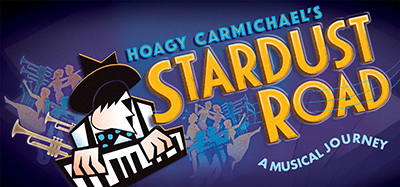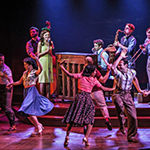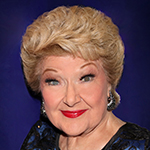Hoagy Carmichael’s Stardust Road
The York Theatre Company
Theatre at St. Jeans, NYC, December 3, 2022
Reviewed by Bart Greenberg

Hoagy Carmichael was an astonishingly prolific songwriter who provided music and/or lyrics for hundreds of songs throughout the 20th century, many of which became part of the Great American Songbook. Now (with the cooperation of his son, Hoagy Bix Carmichael), Susan H. Schulman (direction), Michael Lichtefeld (choreography), and Lawrence Yurman (music direction and arrangements) have conceived a tribute, Hoagy Carmichael’s Stardust Road presented by The York Theatre Company. The project takes an unusual form—half revue, half book musical—although there are no more than three or four lines of dialogue throughout the 90-minute running time. The performers were assigned character names and display certain characteristics (and even clothing styles) through several decades as the romantic relationships shift and change. The audience was taken to a series of nightclubs, from a roadhouse in Indiana to a Harlem hotspot to a World War II USO canteen to a chic Hollywood supper club and, as with all good dramatic journeys, a return to the beginning in Indiana. This format allowed for some genuine humor and even some poignancy as the show shifted mood halfway through. But what really matters in such programs is the music, the singing, and the dancing, and this production scored high points in each category.
Carmichael’s music can be extremely complex, surprising, and seductive, as in “Skylark” (lyric by Johnny Mercer), “The Nearness of You” (Ned Washington), “Georgia on My Mind” (Stuart Gorrell). It could also be high-spirited and able to embrace the vernacular, as in “Ooh! What You Said” (Mercer), “When Love Goes Wrong” (Harold Adamson), “In the Cool, Cool, Cool of the Evening” (Mercer)—for which he won an Oscar). Yurman chose a delightful mix of standards—“Lazy River” (with Sidney Arodin), “Heart and Soul” (Frank Loesser), “Two Sleepy People” (Loesser)—along with such forgotten delights as “Don’t Forget to Say ‘No’” (with Cee Pee Johnson and Lou Victor), “Charlie Two-Step,” and “My Resistance Is Low” (Adamson). Some numbers were grouped together for highly satisfying dramatic effect. For example, three homesick soldiers sang “Memphis in June” (Paul Francis Webster), “Can’t Get Indiana Off My Mind” (Robert De Leon), and “Georgia on My Mind” (Gorrell) in counterpoint. As conductor of an excellent band, Yurman showed a thorough command of the ever-flowing music and was on top of every shift of mood and rhythm.
Lichtefeld’s choreography captured the cornucopia of emotions by suggesting the various periods the scenes were set in without falling back on cliches by going from the strutting in the Harlem club to the elegant ballroom dancing of the postwar era. The entire cast was able to embody the movement, but some dancers soared higher than others. At the top of the list was Cory Lingner, who seemed to launch into steps and leaps every time he so much as lifted a foot. By using all available surfaces, including tables and chairs, to persuade his friends that “The Rhumba Jumps” or by offering a series of high kicks as “Charlie Two-Step,” he seemed to be making up the steps as he went along, although hours of rehearsals had gone into his work.
The rest of the cast, they filled the stage with dance and especially with song. Each of them had their moments to shine, which is what they did. Dion Simmons Grier, whose character “Max” manages several of the clubs until World War II intervenes, possesses an easy charm and a solid voice which he used to both celebrate in “Old Man Harlem” (with Rudy Vallee) and to mourn in “Rogue River Valley.” Sara Esty (“Clara”) tore the place apart by torching “Just a Shade on the Blue Side” (Adamson); she later brought things down with “Skylark.” Markcus Blair (“Buster”) used his fine voice on both upbeat songs—“Gonna Get a Girl” (lyrics by Al Lewis; music by Howard Simon and Paul Ash)—and on more somber ones—“Lyin’ to Myself” (Stanley Adams) tunes.
Danielle Herbert (“Bessie”) was a saucy delight in “How Little We Know” (Mercer) and in a particularly dazzling floor-show routine built around “Heart and Soul” (Loesser), where she showed more than a hint of Eartha Kitt.
Understudy Rachel Fairbanks as “Gloria” was up to the high level of the rest of the cast with her haunting rendition of “Stardust” and her seductive “The Nearness of You.
” Mike Schwitter (“Wallace”) shined with another standard, “I Get Along Without You Very Well (Except Sometimes)” and proved himself to be a fine ballroom dancer on several numbers.
For a show dripping in stardust that offers great music and fine performances, don’t miss Stardust Road at the York Theatre





